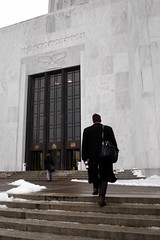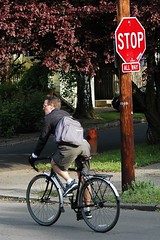Tomorrow I’ll make my first trip down to Salem this session — and what a full day it’s shaping up to be.
My day will start with a meeting of the Oregon Transportation Commission (OTC). The OTC is the five-person, governor-appointed cabinet that sets transportation policy for the Oregon Department of Transportation (ODOT). (I introduced you to them a few weeks ago).
At their meeting tomorrow, the OTC will dole out $102 million for transportation projects — their second installment of stimulus funds. Their first phase of stimulus funding decisions (made earlier this month) included only one bike project and did not include any transit funding.
This second phase is being closely watched by advocacy groups that are in favor of a balanced transportation system. They say ODOT and the OTC have focused way too much on highway widening and re-paving projects. Non-profit group 1000 Friends of Oregon teamed with Smart Growth America to publish a report that brings attention to their concerns and offers a new way forward.
That report, titled, Spending the Stimulus: How Oregon Can Put Thousands Back to Work & Jump-start a 21st Century Transportation System (PDF, 3mb) says Oregon can create jobs and create strong communities by making investments in: maintenance of the existing system, transit and rail projects, and bike and pedestrian facilities. Here’s snip from their report:
“At a time when driving is declining, transit ridership is surging, and repair backlogs are growing, heavy investment in new highways is unlikely to be the best investment in most places.”
After the OTC meeting, I’ll head over to the state capitol building for a full plate of hearings on proposed bike-related legislation. I’ll watch Karl Rohde of the Bicycle Transportation Alliance (BTA) go in front of the House Transportation Committee as they hear about, discuss, and perhaps vote on a variety of bills.
The big one up for hearing tomorrow is HB 2690, a.k.a. the Idaho Stop Law (full bill text). This is the law proposal brought forward by the BTA that would allow bicycle operators to go through stop-signs without stopping when conditions are safe (and after they’ve yielded to all other traffic).
I spoke with the BTA’s Karl Rohde and to lawyer Ray Thomas (who’s on the BTA’s legislative committee) about this today. They both seemed cautiously optimistic about its chances tomorrow. This bill is fraught with risk for the BTA. Not everyone that bikes sees the value in it and anti-bike folks think it will only encourage crazy scofflaws to be even more, well, scofflaw-ish. Perhaps aware of this wide spectrum of opinion about the idea, the BTA has been quiet. They have not sent out widespread action alerts or tried to rally their members in support of the bill.
The risk with that strategy is that legislators on the Transportation Committee won’t hear from their constituents about it. With a law like this, that would fundamentally change how bikes legally treat stop signs, some politicians need to hear support before voting “yes”. We’ll see what happens tomorrow. It should be interesting.
Also up at the hearing is HB 2971 (text). This bill would increase the “allocation of State Highway Fund moneys for footpaths and bicycle trails” from its existing 1% to 2%.
After the hearing at the Transportation Committee, I’ll join Rohde and Ray Thomas at a meeting with key legislators to discuss the Vehicular Homicide bill (HB 3399, text). Introduced by the widow of Tim O’Donnell, this bill would make homicide of another road user while operating a vehicle punishable by a maximum of five years in prison, $125,000 fine, or both. This law would only be triggered if the vehicle operator was driving without a license, without insurance, and was driving impaired.
Stay tuned for reports from Salem.




